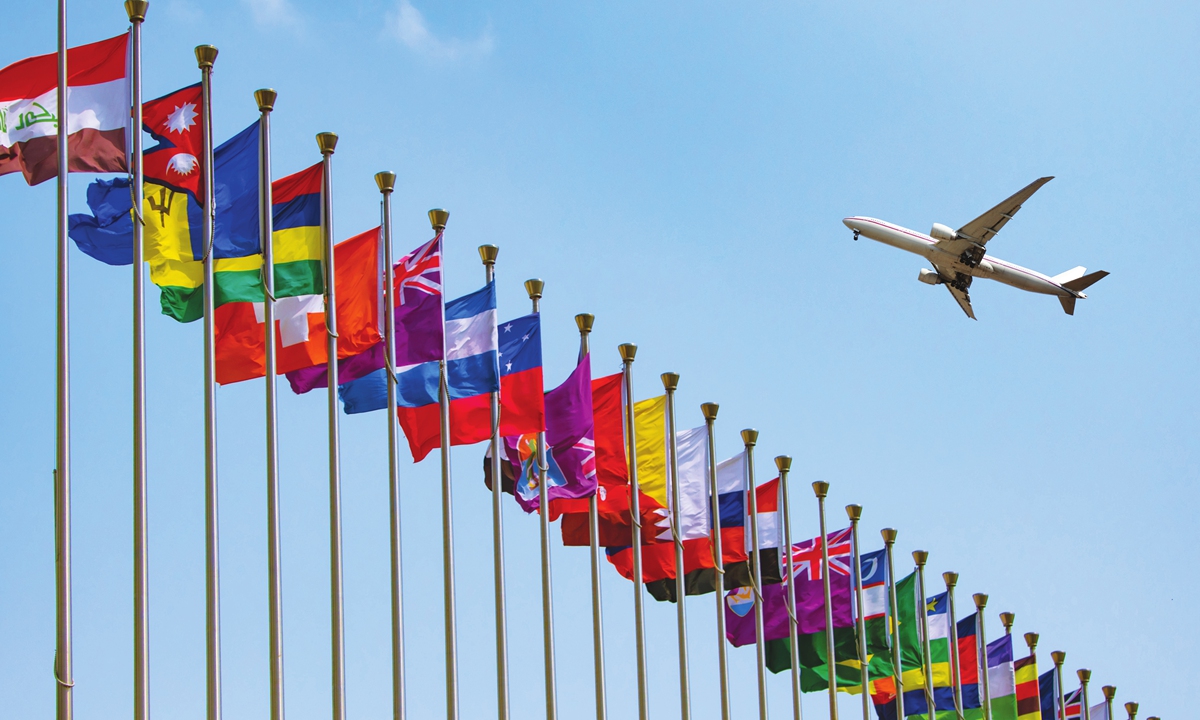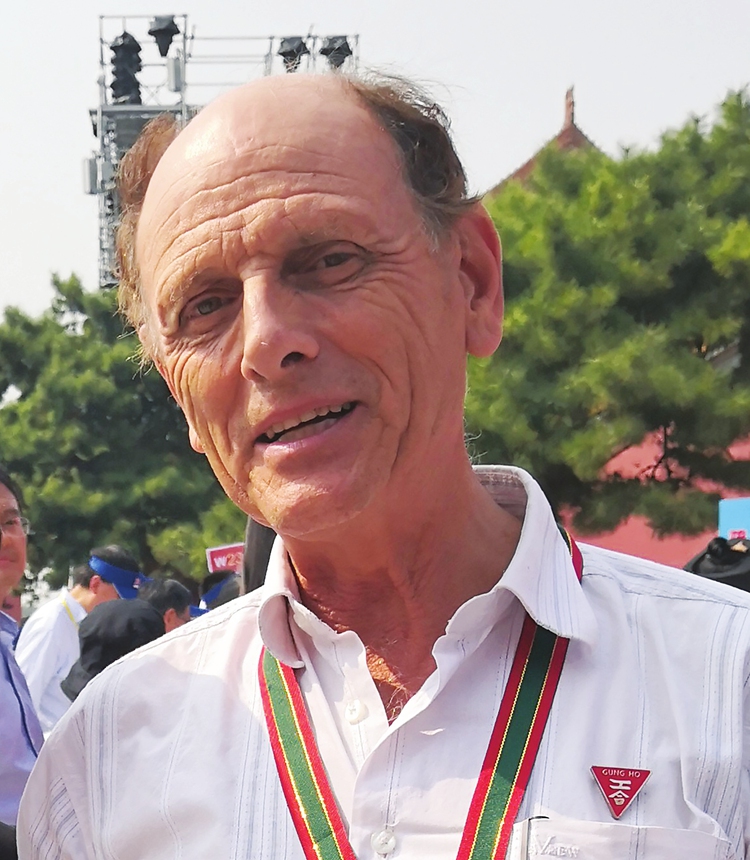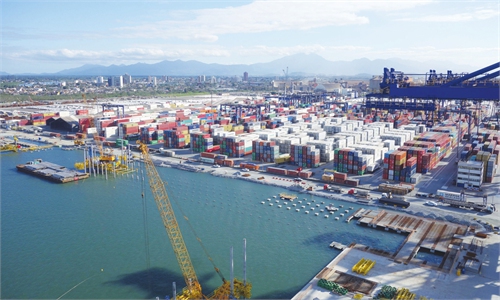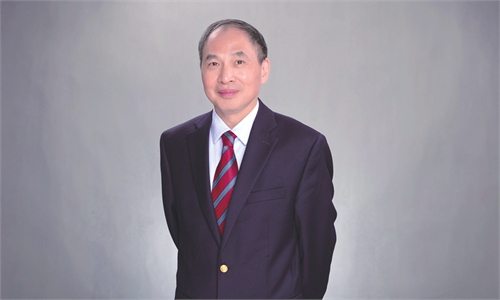Marvelous idea of 'community with a shared future for mankind’ delights me: China-born British-Canadian Michael Crook

Photo: VCG
Editor's Note:For the Chinese people, the past decade was epic and inspirational. The country, under the leadership of the Communist Party of China with Xi Jinping at its core, has made great endeavors in boosting its economy, deepening reforms, improving the rights of its people and acting as a responsible power globally.
While developing rapidly over the years, China has also connected its fate to the global community, mainly through establishing a community with a shared future for mankind. Global Times (GT) reporter Xia Wenxin talked to Michael Crook (Crook), a winner of the Chinese Government Friendship Award and the chairman of the International Committee for the Promotion of Chinese Industrial Cooperatives, about his experience as a witness of the country's development since the 1950s and how he interprets the idea of "a community with a shared future for mankind."
This is the ninth of the series about this special decade.
GT: You were born and raised in China. What changes in the past decades have impressed you the most?
Crook: I am 71, so I was born after the founding of the PRC. Material and social conditions are much better now than they were when I was a child in the 1950s: Food, travel, and housing…
In the 1950s, the collectivization of agriculture helped to improve productivity. Cooperatives, followed by communes, brought a larger scale of production and enabled some mechanization. Some people think communes were a mistake. Well, I don't, because with small family holdings, how can you build reservoirs, irrigation channels, roads, etc., when the state was too poor to do it and lacked an industrial base? But more important than that, communes provided health and education services. Life expectancy rose quickly, and also literacy. Collectivization and the nationalization of the private industry helped improve people's life and production. Then this was an effective way to speed up the building of an industrial base and infrastructure and modernization of agriculture through collective efforts.
Then around 1980 came the reform and opening-up. Productivity took more leaps and bounds. Some think that a market economy with a large private sector is always better than a planned, state economy, whereas I think appropriate development is the secret to China's success. There is no single panacea. The state-owned/operated, planned economy was vital for China in the early phases and was appropriate; without this, the reforms could not have worked. I don't like it when people downplay the achievements of the first 30 years of PRC's development. Market forces without sufficient regulation have a way of favoring the "haves."
Along with tremendous GDP growth came tremendous polarization of wealth and unequal access to services, and even some horrible accidents. Some people did get awfully rich; but at the same time, some people remained pretty poor.
Over the last 10 years, China has learned some valuable lessons. It has been moving away from the excesses of almost laissez-faire capitalism. Now there is a call for more social equality and equal access to social services like healthcare and education. The urban-rural divide was very great. Now the gap is narrowing. For example, social security had been largely confined to the urban population. Now coverage is getting close to universal. And the disparity in entitlements between rural and urban people is much smaller. China's Gini coefficient is still way too high, but it is dropping.
There are two things that really delighted me in the past decade. One is when Xi called upon people to "remain true to our original aspiration and keep our mission firmly in mind" after he became president. The Chinese communists' mission was to fight for a better society for China and its people, and the revolutionary spirit should be kept in mind.
The other is the marvelous idea of a community with a shared future for mankind, connecting China with the rest of the world. This year China is marking the 50th anniversary of diplomatic relations with many Western countries. After reform and opening-up, China joined the WTO. Over the last decade or so, China has begun to take the initiative in establishing mechanisms for international, especially South-South cooperation: SCO, BRICS, AIIB, etc. And, of course, BRI!
GT: On September 14, 2021, President Xi replied to letters from family members of some "international friends" - foreigners who had stood and fought shoulder to shoulder with the Party and the Chinese people through thick and thin and made invaluable contributions to China's revolution. And we know that you participated in writing these letters to President Xi. Could you tell us more about this?
Crook: In 2014, September 3 became a celebration of the Victory of China's Anti-Japanese War and the World Anti-fascist War.
I was honored in 2014 to join a ceremony attended by President Xi Jinping at the Marco Polo Bridge as one of a handful of family members of foreigners who had fought against fascism, whether in China or abroad.
In August 2021, I got an invitation to participate in an education forum due on September 3. Before I accepted the invitation, I called up the Friendship Association and asked, "Will there be a victory celebration this year? Because if so, I'd like to decline another invitation and join it." When I learned there was to be no such event, some friends and I - all family members of foreign friends who had participated in the war - talked about how we should mark the occasion. Someone said, "Maybe we should write a letter to President Xi Jinping." So we linked up a grand total of 16 people who were related to 13 foreign friends and wrote a joint letter.
A few days later, we got a reply! I felt delighted and honored - we all did, because as I said, what is particularly moving is this idea of a shared fate for mankind.

Michael Crook Photo: Courtesy of Crook
GT: You have been working to promote mutual understanding between the West and China. How do you understand a community with a shared future for mankind? What is its value for the world's various culture and civilizations?Crook: The idea is all about mankind living in harmony, learning from each other, and sharing not just material wealth but intellectual wealth.
Unfortunately, the world is rather unfair. In the so-called developed countries, Western Europe and North America, the per capita consumption of the Earth's resources is way higher than that in most developing countries. But I like the idea that the Earth belongs to all.
I would like to see a fair sharing of the Earth's resources. Some parts of the world happen to have better natural conditions and lots of natural resources, and some places have little of anything precious. And in the ideal world order, I feel that there would be more equitable and sustainable consumption of the Earth's resources.
Human civilizations have been around for thousands of years, with highs and lows. Chinese civilization has been consistently pretty high. It's made incredible contributions to human progress in science, technology, and so on.
Western civilization - evolved from the Greco-Roman and other nearby civilizations - is truly glorious! Then in the last 500 years, the wonderful scientific and industrial revolutions. Sadly, there was also the rise of imperialism exploiting their superior technology. Some Western powers tried to take over the world, which has led to some bitter feelings in many former colonies.
But I think it's very important that people do not confuse Western imperialism with Western culture and be very wary of opposing Western culture against Eastern culture. Both Western and Chinese cultures are great despite their differences. They interact with each other. They each have their great strengths and also weaknesses. I see two important mechanisms that promote progress: competition - much valued in the West - and cooperation - greatly valued in the East. Both stimulate development, but competition unfortunately often leads to conflict. Some Western powers regard China as a competitor rather than as a partner in development. That causes tension.
A great Chinese saying is: seek out your common ground and reserve differences. The East and the West should cultivate the best of their cultures because both have so much to contribute.
I feel very lucky that I was born in China to Western parents - Western culture at home. My dad loved Shakespeare, and we would listen to Western classical or folk music. But I went to Chinese schools. I love Peking Opera, but I also love Beethoven, Brahms, and jazz. It's wonderful to be bilingual and bi-cultural!
GT: What role do you think culture plays in establishing a community with a shared future for mankind?
Crook: Cultural exchanges have a tremendous part to play. I feel that it is all wrong to politicize the Olympic Games, for example. Culture, including sports, is generally non-political and can really help cross borders of prejudice and promote understanding and friendship among people. People like Michael Jordan and Michael Jackson did so much to help overcome racial prejudice! You could try and teach ethics in school and say it is always wrong to do this or that, but the impact is much less. I'm strongly in favor of cultural exchanges, and I think culture has a huge role to play in building a world community with a shared future.
GT: What do you think are the obstacles to understanding China in the West?
Crook: I think that establishment Western media is a very pernicious influence right now. When I went to university in London in the 1970s, the local newsagents would sell magazines and newspapers with editorials that often had different, even opposing views on important international affairs. There seems to be less and less of that. When I was in the US in the 80s and went to big newsagents, all the major political newspapers and magazines had identical views in the editorials.
I see two main reasons for this lack of objectivity and refusal to present the other side. Partly political, partly business. A lot of Western media changed their mission from objectivity to promoting Western values, which they arrogantly call "universal values." They see China as a threat and a competitor rather than a partner in development. And it is also about business, which leads the media to report what sells - fear and hysteria, and so on.
Another reason would be cultural differences. Chinese have their ways of thinking, and sometimes their expressions that do not relate to Western values or Western cultural traditions are unconvincing. Another Chinese saying I really like (especially as a teacher) is "know yourself and know the other." Having the cultural self-confidence to hold to one's own values while also being able to express those using terms from another culture. One of my favorite authors, Rudyard Kipling (who was also bilingual and bicultural) said, "East is East, West is West, never the twain shall meet!" I disagree. Some conflicts arise from cultural differences. What seems like a knock-down argument in one culture may seem like a red herring in another. That's why learning another language and culture is so important! Peace and understanding depend on it! Of course, understanding alone is not enough: greed and thirst for power must be controlled.
So I think learning about each other's culture is very beneficial. After the reform and opening-up, there have been tremendous flows of tourism or study abroad, and far more Chinese have traveled abroad and have seen other countries firsthand. I believe that a lot of Chinese people have a much more realistic understanding of the West than they used to. That really argues in favor of mutual understanding and building toward a community with a shared future for mankind.
GT: Many Chinese think that Chinese society views the West more rationally than the West sees China. What's your take on this?
Crook: I don't agree with that, actually, because I think such judgments are based on portrayals of China in Western government-moderated, business-controlled media, which tends to be prejudiced and unfriendly to China.
I'd like to share a personal experience. In 2019, my mother, Isabel Crook, was awarded the Friendship Medal by President Xi Jinping. She was awarded it because she did good anthropological research in China and published several interesting books with excellent reviews from West academia. She was also a good teacher and helped train up good people to work in China's diplomacy, foreign trade, or NGOs.
But in major Western media coverage of the event, I saw not one single good thing said about my mother. Do they think that anthropologists and teachers are bad people? All the Globe and Mail reported, for example, was that she supported the communists, and then they picked out little bits of her life experience that reflect badly on China.
For example, my parents were locked up during the Cultural Revolution. Guess what gets reported? Nothing about her anthropology, nothing about her teaching, but she'd been put in prison.
This sort of coverage really is an example of the bias, prejudice, and muckraking I see in the establishment Western media. But these views are not a reflection of the views of the common people. I know plenty of ordinary Canadian people who don't have these prejudices. They're not always out to attack China. Chinese who form opinions about the people of the West based on the establishment media of the West are quite wrong. I would like to tell the Chinese people not to judge the people of the West - or important international events - through Western media controlled by the Western powers to advance their interests.


